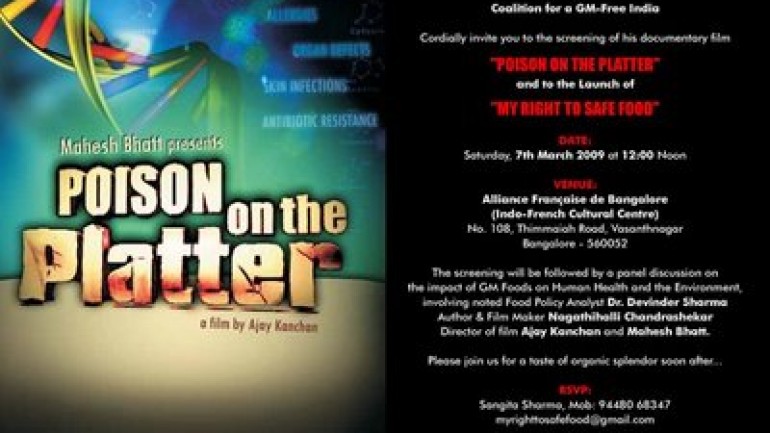Poison on the Platter, is an eye-opening film, made by Mahesh Bhatt and Ajay Kanchan, illustrating how all of our lives are gonna be (adversely) affected by genetically modified foods.
It is no more a farmer’s issue alone, it’s a matter of the consumers’ right to food safety. You and I wouldn’t even be able to separate/choose a normal Brinjal from/over a GM one, if Bt Brinjal – a GM crop produced by the mighty agri-MNC Monsanto – is let through by our corrupt regulatory body.
Let’s put up strong resistance, demanding a ban on GM food/crops for 5 years, until they are proven safe for human consumption by independent, long-term studies.




There is general scientific agreement that food on the market from genetically modified crops is not inherently riskier to human health than conventional food. No reports of ill effects have been documented in the human population from GM food. The starting point for assessing GM food safety is to evaluate its similarity to the non-modified version. Further testing is then done on a case-by-case basis to ensure that concerns over potential toxicity, allergenicity, possible gene transfer to humans or genetic outcrossing to other organisms are satisfied. Although labeling of GMO products in the marketplace is required in 64 countries, the US does not require this. The FDA’s policy is to require a label given significant differences in composition or health impacts. They have not identified such differences in any food currently approved for sale.
Opponents such as the advocacy groups Organic Consumers Association, the Union of Concerned Scientists, and Greenpeace claim risks have not been adequately identified and managed, and they have questioned the objectivity of regulatory authorities.[citation needed] Some medical and environmental groups claim that the potential long-term impact on human health have not been adequately assessed and propose mandatory labeling or a moratorium on such products. The European Network of Scientists for Social and Environmental Responsibility (ENSSER), states that there is no scientific consensus on the relative safety of GM food, and that because of research issues due to intellectual property rights, limited access to research material, differences in methods, analysis and the interpretation of data, it is not possible to state if GMOs are generally safe or unsafe, and instead must be a judged on case-by-case basis. The Institute of Medicine and the National Research Council also determined that GM food safety needs to be assessed on a case-by-case basis, and noted the limited ability of scientists to predict “adverse consequences of genetic change”.